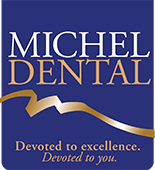Have you ever thought about how often you open and close your mouth? Every time you speak, eat, drink, laugh or yawn your jaw is in motion. That motion happens because of the temporomandibular joint, which is located on either side of your head just in front of your ears. If this joint operates smoothly, then you’re in luck. However, because of the complexity of this joint, there are several conditions that can cause the joint to malfunction, leading to TMJ disorder. Thankfully, Dr. Michael Michel in Topeka, KS, is well skilled in helping people with TMJ disorder.
The Causes of TMJ Disorder
TMJ disorder, or dysfunction, can result from a number of causes, including a traumatic injury to the jaw. However, the most common causes begin in the mouth. For example, when teeth are misaligned, you may unknowing shift your jaw in order to adjust your bite. This shift affects the workings of the temporomandibular joint. Another very common cause is teeth grinding and clenching, or bruxism. Ordinary wear and tear on your teeth that is caused by aging may also lead to TMJ disorder.
The symptoms of TMJ disorder include:
• Jaw soreness or pain
• The sensation of an earache without infection
• A popping or clicking sound when the mouth is opened or closed
• Headaches
• Swelling on the side of the face
• Pain when chewing, biting or yawning
• Sensitive Teeth
• A stiff or locked jaw
Treating TMJ Disorder
If Dr. Michel determines during an evaluation of your jaw and chewing system that you have TMJ disorder, then he will prescribe appropriate treatment. More than likely this will be an oral appliance, or mouthguard, that you’ll wear while sleeping in order to correct misalignment and ease stressed jaw muscles. Other treatment options include building up the back teeth, stress management techniques and lifestyle alterations.
Call Our Office Today
If you are experiencing any of the symptoms of TMJ disorder, schedule an appointment today for Dr. Michel to evaluate your condition. Our office in Topeka, KS, also serves patients in Manhattan, Lawrence, Emporia and the surrounding areas.
